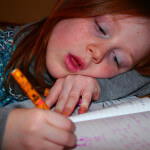Over the years there have been endless studies on the effects of divorce on parents and children. Some of the results are controversial. Others seem to be universally accepted as relevant and real. Here are some insights about how divorce affects children at different ages and stages that I believe all of us, as parents, should take to heart.
Not surprisingly, the first two years of divorce are the most difficult. In some cases it takes an average of three to five years to really “work through” and resolve many of the issues and emotions that come to the surface. For some, the effects of divorce last many additional years — or even a lifetime — if not dealt with appropriately. Taking steps toward a child-centered divorce can dramatically impact the negative effects of divorce on all members of the family. It will help everyone to move through this time rather than merely letting “time heal all wounds.”
Preschoolers tend to be more frightened and anxious, but seem to adjust better than older children in the long run. Their biggest fear is of abandonment. Stressing security and a continuation of family routines is very helpful for them. Older children understand more, but do not have adequate coping skills and therefore can have more long-term problems, if the divorce is poorly handled. This is often because they remember life before the divorce and so experience a greater change of life patterns and dwell more on comparisons between the past and present. Stressing the love both parents have for the child — and that their love will continue forever is vitally important whenever possible.
Children who may have witnessed a troubled marriage and family life may greatly benefit from observing their parents now working out a reasonable and respectful post-divorce co-parenting arrangement. This positive and mature behavior will affect a child’s adjustment more than any other factor. So never fight around the children or badmouth their other parent to them!
It is never too late to create a child-centered divorce, even if you started on the wrong track. Every step you take toward focusing on your children’s emotional, psychological and physical needs as they move through the months and years post-divorce, will be a step toward modeling for them how loving, compassionate, and caring parents respond to their children’s needs. I encourage you to make your relationship with your children’s other parent as respectful and considerate as you can — for the sake of your children. They will thank you!
* * * *
Rosalind Sedacca, CCT is a Divorce & Parenting Coach, Founder of the Child-Centered Divorce Network and author of the internationally acclaimed ebook, How Do I Tell the Kids about the Divorce? A Create-a-Storybook Guide to Preparing Your Children — with Love! For her free ebook on Post-Divorce Parenting along with access to her blog, coaching services and other valuable resources on divorce and parenting issues, go to: www.childcentereddivorce.com.
© Rosalind Sedacca All Rights Reserved






The interviews of young adults whose parents are divorced in the Broken Circle project, support Rosalind’s perspective. Many of the interviewees readily acknowledge their issues with abandonment, self esteem, relationships as a result of the trauma caused by the emotionally charged family environment.
See http://www.brokencircleproject.org
I love Karen Klein’s book. It is a sobering reflection of how children are affected by divorce, as expressed by young adults who were personally affected.